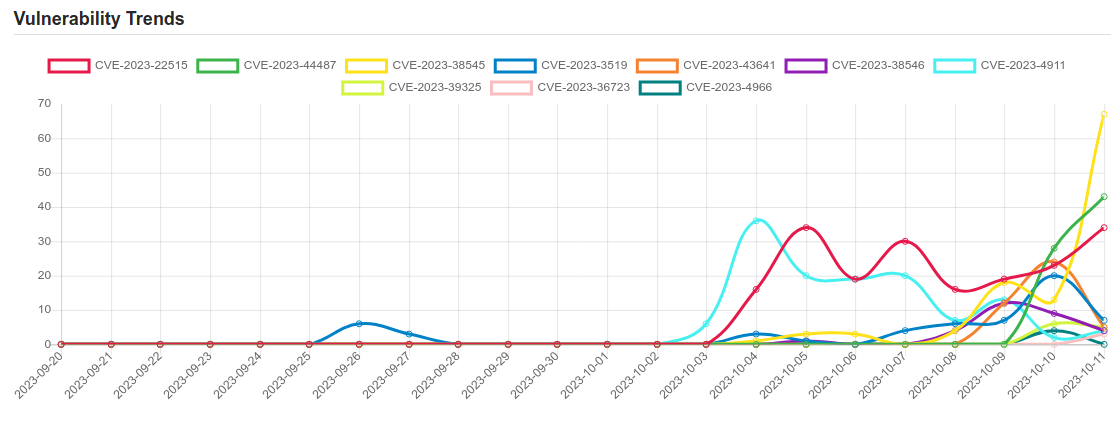Daily Vulnerability Trends: Thu Oct 12 2023

| CVE NAME | CVE Description |
| CVE-2023-38545 | No description provided |
| CVE-2023-43641 | libcue provides an API for parsing and extracting data from CUE sheets. Versions 2.2.1 and prior are vulnerable to out-of-bounds array access. A user of the GNOME desktop environment can be exploited by downloading a cue sheet from a malicious webpage. Because the file is saved to `~/Downloads`, it is then automatically scanned by tracker-miners. And because it has a .cue filename extension, tracker-miners use libcue to parse the file. The file exploits the vulnerability in libcue to gain code execution. This issue is patched in version 2.3.0. |
| CVE-2023-38546 | No description provided |
| CVE-2023-4911 | A buffer overflow was discovered in the GNU C Library’s dynamic loader ld.so while processing the GLIBC_TUNABLES environment variable. This issue could allow a local attacker to use maliciously crafted GLIBC_TUNABLES environment variables when launching binaries with SUID permission to execute code with elevated privileges. |
| CVE-2023-39325 | A malicious HTTP/2 client which rapidly creates requests and immediately resets them can cause excessive server resource consumption. While the total number of requests is bounded by the http2.Server.MaxConcurrentStreams setting, resetting an in-progress request allows the attacker to create a new request while the existing one is still executing. With the fix applied, HTTP/2 servers now bound the number of simultaneously executing handler goroutines to the stream concurrency limit (MaxConcurrentStreams). New requests arriving when at the limit (which can only happen after the client has reset an existing, in-flight request) will be queued until a handler exits. If the request queue grows too large, the server will terminate the connection. This issue is also fixed in golang.org/x/net/http2 for users manually configuring HTTP/2. The default stream concurrency limit is 250 streams (requests) per HTTP/2 connection. This value may be adjusted using the golang.org/x/net/http2 package; see the Server.MaxConcurrentStreams setting and the ConfigureServer function. |
| CVE-2023-4966 | Sensitive information disclosure in NetScaler ADC and NetScaler Gateway when configured as a Gateway (VPN virtual server, ICA Proxy, CVPN, RDP Proxy) or AAA ?virtual?server. |
| CVE-2023-35813 | Multiple Sitecore products allow remote code execution. This affects Experience Manager, Experience Platform, and Experience Commerce through 10.3. |
| CVE-2023-0126 | Pre-authentication path traversal vulnerability in SMA1000 firmware version 12.4.2, which allows an unauthenticated attacker to access arbitrary files and directories stored outside the web root directory. |
| CVE-2022-4908 | Inappropriate implementation in iFrame Sandbox in Google Chrome prior to 107.0.5304.62 allowed a remote attacker to leak cross-origin data via a crafted HTML page. (Chromium security severity: Medium) |
| CVE-2023-42824 | The issue was addressed with improved checks. This issue is fixed in iOS 17.0.3 and iPadOS 17.0.3, iOS 16.7.1 and iPadOS 16.7.1. A local attacker may be able to elevate their privileges. Apple is aware of a report that this issue may have been actively exploited against versions of iOS before iOS 16.6. |
| CVE-2023-40044 | In WS_FTP Server versions prior to 8.7.4 and 8.8.2, a pre-authenticated attacker could leverage a .NET deserialization vulnerability in the Ad Hoc Transfer module to execute remote commands on the underlying WS_FTP Server operating system. |
| CVE-2023-38140 | Windows Kernel Information Disclosure Vulnerability |
| CVE-2023-4863 | Heap buffer overflow in libwebp in Google Chrome prior to 116.0.5845.187 and libwebp 1.3.2 allowed a remote attacker to perform an out of bounds memory write via a crafted HTML page. (Chromium security severity: Critical) |
| CVE-2023-41047 | OctoPrint is a web interface for 3D printers. OctoPrint versions up until and including 1.9.2 contain a vulnerability that allows malicious admins to configure a specially crafted GCODE script that will allow code execution during rendering of that script. An attacker might use this to extract data managed by OctoPrint, or manipulate data managed by OctoPrint, as well as execute arbitrary commands with the rights of the OctoPrint process on the server system. OctoPrint versions from 1.9.3 onward have been patched. Administrators of OctoPrint instances are advised to make sure they can trust all other administrators on their instance and to also not blindly configure arbitrary GCODE scripts found online or provided to them by third parties. |
| CVE-2023-22515 | Atlassian has been made aware of an issue reported by a handful of customers where external attackers may have exploited a previously unknown vulnerability in publicly accessible Confluence Data Center and Server instances to create unauthorized Confluence administrator accounts and access Confluence instances. Atlassian Cloud sites are not affected by this vulnerability. If your Confluence site is accessed via an atlassian.net domain, it is hosted by Atlassian and is not vulnerable to this issue. For more details, please review the linked advisory on this CVE. |
A considerable amount of time and effort goes into maintaining this website, creating backend automation and creating new features and content for you to make actionable intelligence decisions. Everyone that supports the site helps enable new functionality.
If you like the site, please support us on “Patreon” or “Buy Me A Coffee” using the buttons below
To keep up to date follow us on the below channels.


